Unit3新编研究生基础综合英语邱东林
(完整word版)研究生基础综合英语邱东林版课后翻译答案1-8
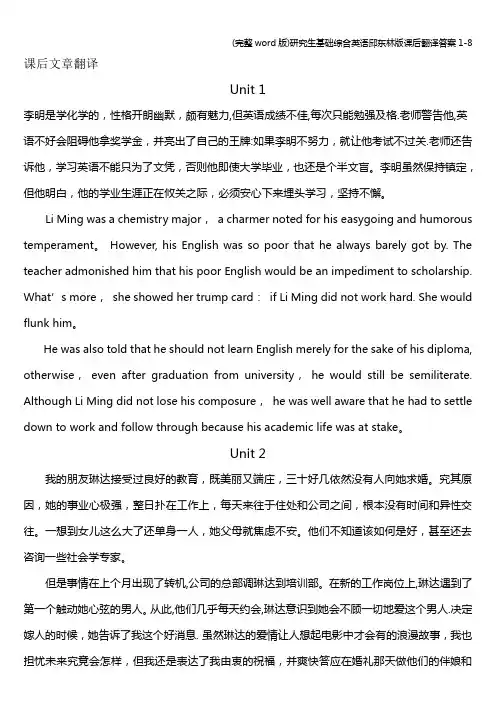
课后文章翻译Unit 1李明是学化学的,性格开朗幽默,颇有魅力,但英语成绩不佳,每次只能勉强及格.老师警告他,英语不好会阻碍他拿奖学金,并亮出了自己的王牌:如果李明不努力,就让他考试不过关.老师还告诉他,学习英语不能只为了文凭,否则他即使大学毕业,也还是个半文盲。
李明虽然保持镇定,但他明白,他的学业生涯正在攸关之际,必须安心下来埋头学习,坚持不懈。
Li Ming was a chemistry major,a charmer noted for his easygoing and humorous temperament。
However, his English was so poor that he always barely got by. The teacher admonished him that his poor English would be an impediment to scholarship. What’s more,she showed her trump card:if Li Ming did not work hard. She would flunk him。
He was also told that he should not learn English merely for the sake of his diploma, otherwise,even after graduation from university,he would still be semiliterate. Although Li Ming did not lose his composure,he was well aware that he had to settle down to work and follow through because his academic life was at stake。
研究生基础综合英语邱东林版课后翻译答案1-8
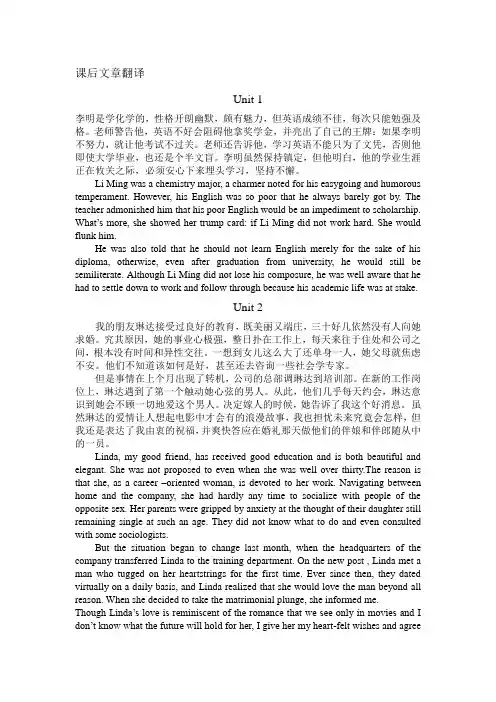
课后文章翻译Unit 1李明是学化学的,性格开朗幽默,颇有魅力,但英语成绩不佳,每次只能勉强及格。
老师警告他,英语不好会阻碍他拿奖学金,并亮出了自己的王牌:如果李明不努力,就让他考试不过关。
老师还告诉他,学习英语不能只为了文凭,否则他即使大学毕业,也还是个半文盲。
李明虽然保持镇定,但他明白,他的学业生涯正在攸关之际,必须安心下来埋头学习,坚持不懈。
Li Ming was a chemistry major, a charmer noted for his easygoing and humorous temperament. However, his English was so poor that he always barely got by. The teacher admonished him that his poor English would be an impediment to scholarship. What’s more, she showed her trump card: if Li Ming did not work hard. She would flunk him.He was also told that he should not learn English merely for the sake of his diploma, otherwise, even after graduation from university, he would still be semiliterate. Although Li Ming did not lose his composure, he was well aware that he had to settle down to work and follow through because his academic life was at stake.Unit 2我的朋友琳达接受过良好的教育,既美丽又端庄,三十好几依然没有人向她求婚。
研究生基础综合英语(邱东林版)课文中英对照加课后习题答案
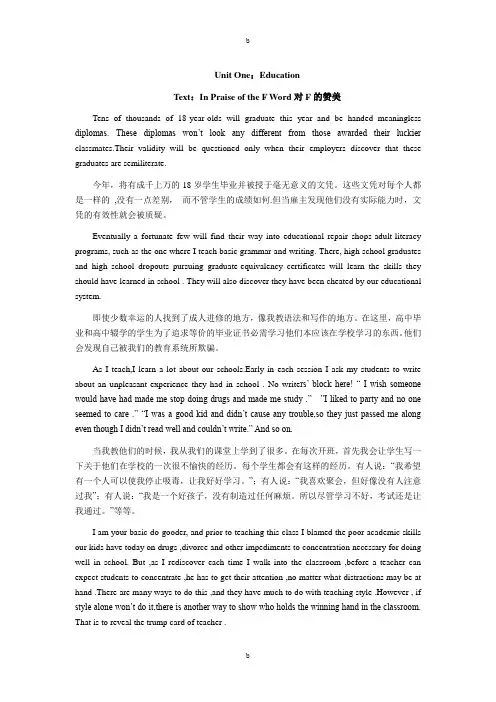
Unit One:EducationText:In Praise of the F Word对F的赞美Tens of thousands of 18-year-olds will graduate this year and be handed meaningless diplomas. These diplomas won’t look any different from those awarded their luckier classmates.Their validity will be questioned only when their employers discover that these graduates are semiliterate.今年,将有成千上万的18岁学生毕业并被授于毫无意义的文凭。
这些文凭对每个人都是一样的,没有一点差别,而不管学生的成绩如何.但当雇主发现他们没有实际能力时,文凭的有效性就会被质疑。
Eventually a fortunate few will find their way into educational repair shops-adult-literacy programs, such as the one where I teach basic grammar and writing. There, high school graduates and high school dropouts pursuing graduate-equivalency certificates will learn the skills they should have learned in school . They will also discover they have been cheated by our educational system.即使少数幸运的人找到了成人进修的地方,像我教语法和写作的地方。
基础综合英语听力材料__邱东林
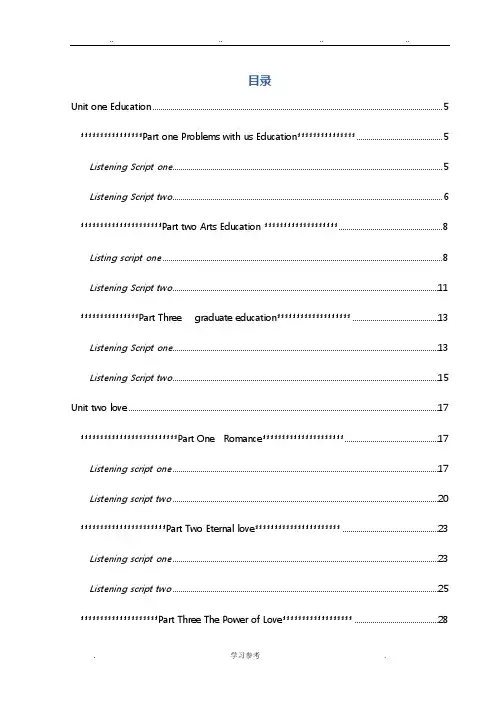
目录Unit one Education (5)****************Part one Problems with us Education*************** (5)Listening Script one (5)Listening Script two (6)*********************Part two Arts Education ******************* (8)Listing script one (8)Listening Script two (11)***************Part Three graduate education******************* (13)Listening Script one (13)Listening Script two (15)Unit two love (17)*************************Part One Romance********************* (17)Listening script one (17)Listening script two (20)**********************Part Two Eternal love********************** (23)Listening script one (23)Listening script two (25)********************Part Three The Power of Love****************** (28)Listening script two (31)Unit Three Health (35)*************Part One Is Overweight a Problem?*************** (35)Listening script one (35)Listening script two (37)**************Part Two New Four Food Group***************** (39)Listening script one (39)Listening script two (42)************Part Three There Are Worse Things than Dying********** (45)Listening script one (45)Listening script two (48)Unit four technology (50)**********************Part one cell phone******************** (50)Listening script one (50)Listening script two (53)*********************Part two internet*********************** (54)Listening script one (54)Listening script two (57)*******************Part three computer giants***************** (60)Listening script two (62)Unit Five Success and Happiness (64)********************Part one Success Is a Choice******************** (64)Listening Script one (64)Listening Script two (66)******************Part Two Can We Find Happiness***************** (69)Listening Script one (69)Listening Script two (72)***************Part Three The Sweet Success of Branding************* (74)Listening Script one (74)Listening Script two (77)Unit Six Globalization (81)*************Part one Three Eras of Globalization************* (81)Listening Script one (81)Listening Script two (82)***************Part Two Globalization and China************** (84)Listening Script one (84)Listening Script two (86)************Part Three Globalization and Inequality************ (87)Listening Script two (89)Unit Seven Plagiarism (91)******************Part one Defining Plagiarism**************** (91)Listening Script one (91)Listening Script two (92)*****************Part Two Plagiarism in College*************** (94)Listening Script one (94)Listening Script two (96)****************Part Three Avoiding Plagiarism*************** (98)Listening Script one (98)Listening Script two (101)Unit Eight Patriotism (102)******************Part one My Chinese Heart***************** (102)Listening Script one (102)Listening Script two (104)***************Part Two Comments on Patriotism************** (106)Listening Script one (106)Listening Script two (108)****************Part Three Pride of the Nation***************** (109)Listening Script two (111)Unit one Education****************Part one Problems with us Education*************** Listening Script oneWhen I was in college I had an English major and for a while I considered going into teaching. While I was exploring the possibility of becoming a teacher, I did a lot of thinking about the way that the education system in the United States is run. And I disagree with a lot of the ways that things seem to happen and have happened for a long time in our educational system.Uh ... people don't seem to recognize various kinds of intelligence; they seem to just want to give standardized tests and peg you for what you are capable of very early on your education. I've always felt that a lot of classes tha t you’re forced to take in high school are not really geared towards what you are going to be doing. There’s very little emphasis on your own special interests. Uh ... everybody’s sort of treated like they're the same person. Everything is very generalized. There’s a lot of uh ... there’s a lot of pressure on students to be as well-rounded as possible. I think being well-rounded isn’t really possible because it becomes impossible to develop any one part of yourself, um ... to any great degree. And as a resu lt people can’t get intogood colleges if they, yaknow, haven’t, yaknow, scored the ... the right thing on the math section of SAT, even if they are brilliant writers, and vice versa. You know, um... people just really are not given a chance, I think, in a lot of cases.Another thing that really disturbs me is the way that students are separated from each other. I got involved with vocational education, uh ... which means that the kids go out to a technical or trade school for part of the week, and then they come back to the home school for the other part of the week and they take their academic classes. However, those kids are kept separate from the rest of the school almost as if they’re below them. There’s a lot of stratification. Um ... at any rate I fee l that the kids are very aware of the way that they’re perceived by the educators, by their teachers and, yaknow, by their peers. And I think that it ...it causes them to act in a way that... is ... not really optimal. And that’s pretty sad to me. I actua lly had kids tell me when I was teaching them, “yaknow, we’re the just bad class; we... yaknow, it’s not that we have a problem with you personally; yaknow, we are just bad. We are bad kids” because pretty much that was what they felt they were. And yaknow, their classes were very limiting, uh the teachers never try to do anything creative with those classes. I think that many of the kids in that class were intelligent, but never actually realized their potential because of the way they were tracked very early on their education.Listening Script twoMargaret Warner: Mr. Unz. Why do you believe that bilingual education should be scrapped?Ron Unz: Well, the overwhelming practical evidence is that bilingual education has failed on every large scale case that’s been tried in the United States, in particular in California. The origins of this initiative was the case last year of a lot of immigrant Latino parents in downtown LA, who had to begin a public boycott of their local elementary school to try to force the school to give their children the right to be taught English, which the school was denying. And I think that really opened my eyes to the current state of the program in California, where the statistics are dreadful.Margaret Warner: Mr. Lyons.Janies Lyons: It is not the case that bilingual education is failing children. There are poor bilingual education programs, just as there are poor programs of every type in our schools today. But bilingual education has made it possible for children to have continuous development in their native language, while they're in the process of learning English, something that doesn't hap pen overnight, and it’s made it possible for children to learn math and science at a rate equal to English-speaking children while t hey’re in the process of acquiring English. Margaret Warner: Mr. Unz, what about that point — for these children who don't speak English well they will fall behind in the basic subjects if they can't be taught those in Spanish, or whatever language? I shouldn’t say just Spanish, but whatever their family’s language is.Ron Unz: That’s a very reasonable point. And to the extent that we’re talking about older children. 14 or 15 year olds who come to the United States, don't know any English and are put in the public schools I think a very reasonable case canbe made for bilingual education. I don’t know if it’s correct, but at least you can make a case for it. But most of the children we're talking about enter California or America public schools when they’re five or six or seven. At the age of five years old, the only academic subjects a child is really doing is drawing with crayons or cutting and, you know, with paper and that type of thing. And at that age children can learn another language so quickly and easily that the only reasonable thing to do is to put them in a program where they're taught English as rapidly as possible and then put into the mainstream classes with the other children so they can move forward academically.Margaret Warner: There is something to that point, isn’t there, Mr. Lyons, that very young children do absorb languages very quickly?James Lyons: They absorb certain facets of language very quickly. They learn to speak in an unaccented form like a native English speaker. But the research shows that actually adults are much more efficient and quicker language learners than children because they're working from a broader linguistic base, a greater conceptual base. I really take objection to what Mr. Unz is saying that children at the age of five, six, and seven are only coloring and cutting out paper.That isn't going to lead to the high standards.*********************Part two Arts Education ******************* Listing script oneInterviewer: Professor Gardner, what did you find in your studies to be the biggest difference between arts education in the United States and artseducation in China? What struck you most, then?Gardner:I was so struck by the differences between arts education in the United States and arts education in China. US youngsters love to explore andthink that they explore very well; and yet, without the requisitediscipline, their products are typically of little interest —exceptperhaps to their doting parents.Education in all of the arts in China is very precisely prescribed.Teachers and parents know exactly what they want children to be ableto do and they know how to get the desired behaviour andperformance in almost perfect fashion. On the other hand, there is littlefree exploration.But I must add another surprise. When young children in China weregiven a novel task in the arts, they performed very well. Before visitingChina, I had thought that young people must always begin with aperiod of free exploration, before they begin to acquire discipline andskills. After visiting China and thinking about what I had seen, I came toa different conclusion. It is not important that one "explore" first; whatis important is that one has a significant period for exploration, eitherbefore, during, or after one has acquired some discipline. Interviewer: As you might have noticed, these days after-school classes in music, dance, painting and calligraphy are very popular in China, althoughmany of the "young emperors" might not be so willing to learn allthese "extra skills." What's your opinion on this?Gardner: The fewer children you have, and the more resources at your disposal, the more likely you are to give your children every form of enrichment.China has thousands of years of history of encouraging talentdevelopment, so it is not at all a surprise that many kids are takingafter-school arts classes. But what children do when their parents pushthem, is very different than what they do when they grow up, and theirparents are no longer in control of the rewards and punishment. Byand large, those grown up students who continue their area of talentare those who use the talent professionally and those who gainintrinsic pleasure from the activity.Interviewer: In recent years, art museums and community arts centres have been mushrooming in China as the country experiences rapid modernizationand internationalization. How do you balance arts education in schoolsand arts education beyond school Walls?Gardner:It is entirely to the good that students now have opportunities to learn about the arts outside of class —in museums, in children’s palaces,through the electronic media, community centres, and outdoorinstallations. Very often children learn much more comfortably andpersonally in what we call “informal educational settings.”Optimally, there should be a division of labour between schools andinformal settings. As just one example: Schools could focus more onproviding history and cultural background — whereas museums mightprovide the opportunity to learn about special topics, or probe into atopic more deeply.Listening Script twoAnn: Do you find there’s much opportunity... to do other things, besides studying, during term- time? I mean, if you have a, a very academic course, you say the social life is good, but you might not always have time to, er, enjoy it, if you ...have a lot...Ian: Not being a very academic course, I wouldn’t know.Ann:How about you, Tony?Tony: I suppose ... a business course isn’t particularly academic, if you like, but, er, I certainly find quite enough time to do newspapers and ... all I want to do on the social side. [Yes] Go to dances and so, on.Ian:But then you work till five in the morning, don’t you? [Laughter]Tony:Let’s not bring personalities into this!Ann:D'you think that a lot of students, are interested in producing things like newspapers and plays and writing poetry?Tony: No, but a lot of students like to have those things and a few students like to do them. This is why, I mean if you had—out of a college of, what is it, fifteen hundred students — if you had five hundred students going along to the Drama Club on the first week of term ... they try and mount two productions out of five hundred people. It’d be absolutely impossible. Yet, there are those, the sufficient people to see, what is it, twenty, thirty people, doing those produc tions. It’s the same with the newspaper.Ann: Yes. But erm, I think this is because more students haven’t got the confidence to show the work they do. I think a lot of students write things and paint, in the background, and just don’t like to er ...Ian:Er, I think, I think myself, they’re just not interested, in [You don’] sort of taking part in joint efforts. They prefer just to erm, well, they might write poetry on their own or something, but they were asked to write something for a newspaper, they wou ldn’t be interested.Ann:Is this because the courses are too difficult? They have too much academic work, as I said before?Tony:I think it’s all psychological, to bring a nice big word into it! Erm ... those students think they shouldn’t do it, because they think they won’t have [Mm] time and so on. I think this is the thing. It’s not a question of not having enough time. It’s jus t organizing it. I mean, Ian says I stay up till five in the morning or whatever, you know, never go to bed till two. [Yes] You can, if you, if you’re determined to do something, you can arrange it. You can say, “Okay, I’ll do the newspaper between lecture s finishing at four, or whatever, and go home at six”, and you have two hours a day on the newspaper, say. You know, [Yes] just, say, this is a way of organizing things. A lot of other students will say at four, “Oh dear, I must go on working, but before t hat I must have a break”. And they spend two hours in a coffee bar. Okay, this [laughter] is the way they want to organize their time. [Yes] They spend i t...you know ... it’s just that I want to do it doing newspaper, whereas other students want to drink coffee.Ann: So, in other words, students have an awful lot of freedom of choice on how they organize their social life and how they organize their working life, how they spend their money. And I think this is erm, one of the ideal things about being a student.Ian: You’re not tied down by anything. You just do more or less as you please, within the framework of going to lectures, or the majority of lectures. Ann:Yes, that’s right, I mean, I, I have worked before and erm ... although I had, theoretically, a lot more free time ... erm ... it was only within certain hours, you know, after working hours, and at weekends, [Mm] and this isn’t what I call free time. You know, I mean, at the moment with lectures, you can take off two or three hours during the afternoon and go to see an art exhibition.Whereas if you’re ... erm, working all week, you have to restrict it to weekends when the art gallery is ... crowded with the weekend trippers and, [Mm. Mm.] and it’s quite unpleasant.***************Part Three graduate education******************* Listening Script oneDaniel Denecke: Hello and welcome! Thank you for the opportunity to speak to so many of you about the issues facing graduate education today. Virginia: Hi, Daniel. My company recently hired a lot of PhDs. Many have good research skills, but no social skills and no working experiences besides academic experiences. Maybe universities can do a better job to address this issue.Daniel Denecke: This is something that graduate deans are beginning to address now through various professional development programs.At the master’s level, there are many “professional master’s degrees” that combine core, curricular content of a traditional degree with internships and workshops in “soft skills” such as commu nication, presentation, lab and budget management, etc.New York, N.Y.: Hello Daniel. Isn’t it a little disingenuous to talk about how we need to protect America’s huge production of PhDs when America can’t employ many of those PhDs? When the academic job market is so tight, it seems like perhaps we need to do a better job of screening people out of doctoral programs, rather than accepting so many who will only be disappointed when they can’t get the jobs they want.Daniel Denecke: Some disciplines (History, for example) have attempted to address this by limiting enrollments.My own opinion is that a graduate degree is not only about preparing students for a “job” slot that already exists. Graduate degrees are giving people the high level cognitive skills and advanced thinking that will enable them to be flexible and to adapt to an economic world where jobs are always changing. This is why China and India and Europe are so aggressively building up their graduate degree programs.Princeton, N.J.: Hi, I'm ve ry grateful for this Q&A session. I’m an electrical engineering doctoral student in my third year. When I got shoulder-deep into doctoral research, I found it to be arduous and unrewarding, and I’m leavinggraduate school without my PhD.My question then is: in the face of 50-60% attrition rates, should we really be handing out fellowships and support to push students right out of undergrad (like myself) who don’t nec essarily know what they want to do with their lives?Won't this worsen the attrition rates? Thank you for your time.Daniel Denecke: One of the things that universities are doing now to try to address exactly the problem you experienced here is to enhance the pre-admission and orientation processes so that students have a better sense of what a career in research entails. For instance, pre-admission summer research opportunities, workshops peer mentoring, etc.Burke, Va.: Hello, Daniel. Is it better for future career prospects to earn a master's degree from an online university or to earn a master's degree from a university where classroom attendance at the university is a compulsory step to graduating?Daniel Denecke: Distance and online graduate education is becoming more and more common. But there is a lot of fluctuation in quality. Some online degrees are very good, and for others the quality is unknown or contested Regional accreditation is one way of inquiring about how the graduate education community perceived these degrees.Listening Script twoSince we’re meeting here at Wisconsin, I'll draw upon a local example of a faculty member who embodies the principle of research and education being twosides of the same “integrated” coin. U.W. plant pathologist Paul Williams invented what are called “Fast Plants” — these go from being a seed to producing seeds in just 35 days. Fast plants were first developed as a research tool for biologists, but have come to be used in science classrooms around the globe. Because the plants grow and develop so fast, students can study the plants’ genetic cha nges over a semester. Profes sor Williams says fast plants “became part of a larger sea-change in the way biology is taught. We measure our success,” he says, “by how much our ideas are adopted and adapted.” What a glowing example of integrating education and research!Throughout my own career, I have had a passion for the integration of teaching and learning with research, within both undergraduate and graduate education. Educating engineers has occupied the greater part of my life. While I was Dean of Engineering at the University of Pennsylvania, we experienced the usual challenges in supporting our graduate students financially as well as intellectually. One mechanism of financial support, still ubiquitous across academe, was to appoint first-year graduate students as Teaching Assistants (TAs), a kind of itinerant labor performed adhoc for pay, and rarely integrated within the students’ research activities. This practice fosters t h e attitude among students that teaching is some sort of “add-on”, not part and parcel of their doctoral education.However, our Department of Chemical. Engineering implemented quite another approach —to support all first-year graduate students fully the first year, with stipend funds drawn primarily from departmental general funds contributed by the Dean, industry and endowment income. Then, around each student’s third year, heor she would undertake a teaching practicum—first, being given preparation on how to teach and, second, teaching undergrads as a component of the doctoral curriculum.When I tried to institutionalize this paradigm across the school, one argument posed against it was that since the graduate students were partly supported by industrial monies, industry would not want their investment used for a teaching practicum. So. I canvassed a group of CEQs — and 100% of them said they’d love to hire PhDs with both teaching training and experience.Indeed, graduate students today may follow ever more diverse pathways, yet all will need the skills of teaching and learning, whether they end up as professors, practicing in industry, or serving in government.Unit two love*************************Part One Romance********************* Listening script oneOur love story is not your average love story. Although I was bom in 1960 and my husband Joe was born in 1962, our story really began much earlier on a trip from Austria to Halifax in October 1947. That is a trip both our fathers took to find a new life in Canada. They did not know each other and could not recall ever meeting aboard the ship. Little could they have known that fate was taking a long journey, one that would unite their unborn children in 1992.My father, upon his arrival in Canada, lived and worked in several different citiesacross the country before settling in Toronto. Joe’s father did the same but lived in Thunder Bay, Ont., for quite a few years before he moved his family to Toronto in 1968. Both our fathers were pen pals with the women they would eventually marry, bringing them to Canada from their respective homelands in 1958. They had three children each (Joe and myself being the middle children). What is also very interesting is the fact that Joe’s father and my father both worked in construction.Fast-forward several decades: I was working for a large bank in downtown Toronto’s financial district. One day as I walked through an underground concourse, I passed a man in the hall and with just one glance something struck me about him. He seemed to have a brooding quality. Of average height, he had large broad shoulders and longish, wavy dark-brown hair, a short beard and great eyes. There was a certain aura about him. Knowing how many people worked in the district, I knew I wouldn't see him any time soon. Several months later, I passed him in the concourse once again He was walking with a woman I used to work with. Disappointed, I assumed he was dating her and that was it for me.Several more months passed and I was now working in an area that was accessible only by a stairway. One day I was going down the stairs when I passed him going up. I could not believe my eyes! It was then that I realized: We worked for the same company! I was floored to say the I attempted to smile at him, but he was looking down.1 asked around and found out his name was Joe, which department he worked in and, most important, that he was not attached! Then, as I was debating whether to put my name in for our annual baseball team, I saw his name on the sign-up sheet.That made up my mind for me!Our games were played on Centre Island, a short ferry ride from the Toronto shoreline on Lake Ontario, and our eyes locked while we were on the boat taking us there. Something inexplicable passed between us: We connected. Soon, we were cheering each other on as we played our game, and on the way back I worked up the courage to introduce myself. “Hi! My name is Rosemary. What do you do at the bank?”Later, we ended up working side by side after he took a position in my department. Our relationship slowly progressed as we got to know each other. Living in fairly close proximity, we found ourselves taking the subway home together every day. Our friendship blossomed.On Remembrance Day, 1993, Joe was out of the office on a course. He called to tell me how he felt about me. He said, “I can’t stop thinking about you, Rosemary. And I can’t sleep at night." That day, and with those words, my life changed forever.Because we were working together, I was apprehensive about dating him, but after several months of intensifying feelings, we could no longer hold off. We had been dating for eight months when he proposed on the first day of spring in 1994. We were married on May 6, 1995. It was the most perfect day and we had the best time ever! Although we were in our mid-3os, getting married for the first time, God has blessed us with two wonderful children. Life cannot be any better.So, you see, fate already had things in store for us back in 1947. Some say that fate does not exist, that our lives are just random occurrences and coincidences. We beg to differ. A web was being woven even before we were born. That is fate!Listening script twoWhen Harry Met SallyHarry: Well how about this way. I love that you get cold when it’s seventy on e degrees out, I love that it takes you an hour and a half to order a sandwich,I love that you get a little crinkle above your nose when you’re looking at melike I’m nuts, I love that after I spend a day with you I can still smell your perfume on my clothes and I love that you are the last person I want to talk to before I go to sleep at night. And it’s not because I’m lonely, and it’s not because it’s New Year’s Eve. I came here tonight because when you realise you want to spend the rest of your life with somebody, you want the rest of the life to start as soon as possible.Sally: You see, that is just like you Harry. You say things like that and you make it impossible for me to hate you. And I hate you Harry... I really hate you. I hate you.Endless LoveEndless LoveMy love,There’s only you in my lifeThe only thing that’s brightMy first love,You’re every breath that I takeYou’re every step I makeAnd II want to shareAll my love with youNo one else will do ...And your eyesYour eyes, your eyesThey tell me how much you care Ooh yes, you will always beMy endless loveTwo hearts,Two hearts that beat as one Our lives have just begunForeverI'll hold you close in my armsI can’t resist your charmsAnd loveOh, love。
基础综合英语听力材料--邱东林.(精选)
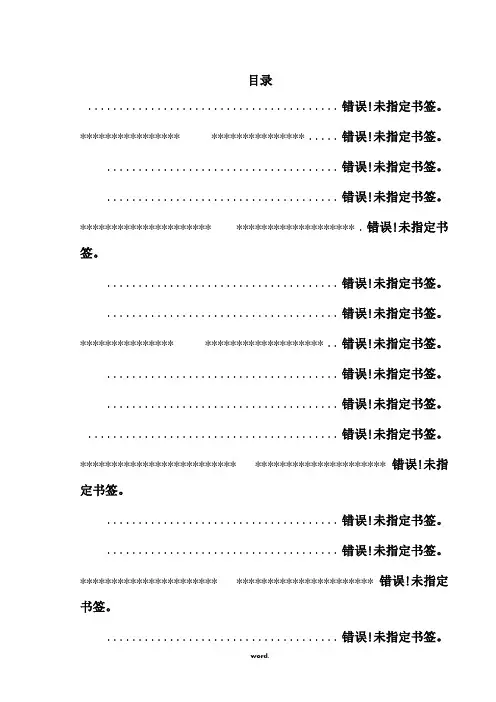
目录........................................ 错误!未指定书签。
**************** *************** ..... 错误!未指定书签。
..................................... 错误!未指定书签。
..................................... 错误!未指定书签。
********************* ******************* . 错误!未指定书签。
..................................... 错误!未指定书签。
..................................... 错误!未指定书签。
*************** ******************* .. 错误!未指定书签。
..................................... 错误!未指定书签。
..................................... 错误!未指定书签。
........................................ 错误!未指定书签。
************************* ********************* 错误!未指定书签。
..................................... 错误!未指定书签。
..................................... 错误!未指定书签。
********************** ********************** 错误!未指定书签。
..................................... 错误!未指定书签。
..................................... 错误!未指定书签。
研究生基础综合英语(邱东林版)中英对照
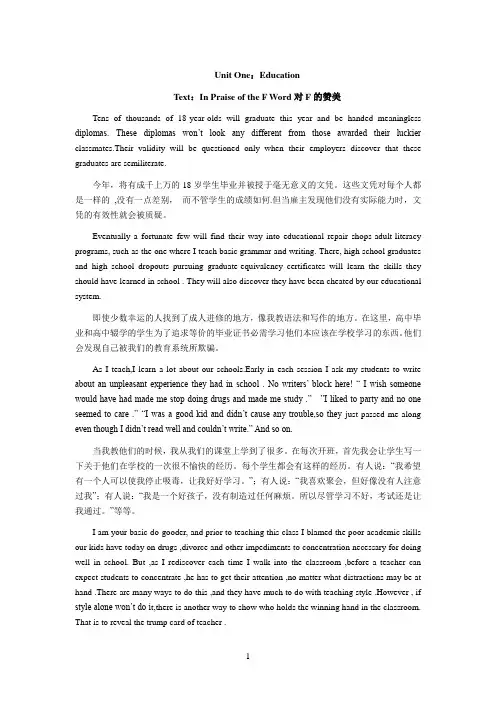
Unit One:EducationText:In Praise of the F Word对F的赞美Tens of thousands of 18-year-olds will graduate this year and be handed meaningless diplomas. These diplomas won’t look any different from those awarded their luckier classmates.Their validity will be questioned only when their employers discover that these graduates are semiliterate.今年,将有成千上万的18岁学生毕业并被授于毫无意义的文凭。
这些文凭对每个人都是一样的,没有一点差别,而不管学生的成绩如何.但当雇主发现他们没有实际能力时,文凭的有效性就会被质疑。
Eventually a fortunate few will find their way into educational repair shops-adult-literacy programs, such as the one where I teach basic grammar and writing. There, high school graduates and high school dropouts pursuing graduate-equivalency certificates will learn the skills they should have learned in school . They will also discover they have been cheated by our educational system.即使少数幸运的人找到了成人进修的地方,像我教语法和写作的地方。
基础综合英语(邱东林版)课文中英对照加课
Unit One:EducationText:In Praise of the F Word对F的赞美Tens of thousands of 18-year-olds will graduate this year and be handed meaningless diplomas. These diplomas won’t look any different from those awarded their luckier classmates.Their validity will be questioned only when their employers discover that these graduates are semiliterate.今年,将有成千上万的18岁学生毕业并被授于毫无意义的文凭。
这些文凭对每个人都是一样的,没有一点差别,而不管学生的成绩如何.但当雇主发现他们没有实际能力时,文凭的有效性就会被质疑。
Eventually a fortunate few will find their way into educational repair shops-adult-literacy programs, such as the one where I teach basic grammar and writing. There, high school graduates and high school dropouts pursuing graduate-equivalency certificates will learn the skills they should have learned in school . They will also discover they have been cheated by our educational system.即使少数幸运的人找到了成人进修的地方,像我教语法和写作的地方。
研究生基础综合英语1-4全文(中英文对照)-邱少林版
研究生基础综合英语1-4全文(中英文对照)-邱少林版Unit One:EducationText:In Praise of the F Word对F的赞美Tens of thousands of 18-year-olds will graduate this year and be handed meaningless diplomas. These diplomas won’t look any different from those awarded their luckier classmates.Their validity will be questioned only when their employers discover that these graduates are semiliterate.今年,将有成千上万的18岁学生毕业并被授于毫无意义的文凭。
这些文凭对每个人都是一样的,没有一点差别,而不管学生的成绩如何.但当雇主发现他们没有实际能力时,文凭的有效性就会被质疑。
Eventually a fortunate few will find their way into educational repair shops-adult-literacy programs, such as the one where I teach basic grammar and writing. There, high school graduates and high school dropouts pursuing graduate-equivalency certificates will learn the skills they should have learned in school . They will also discover they have been cheated by our educational system.即使少数幸运的人找到了成人进修的地方,像我教语法和写作的地方。
研究生基础综合英语1-4全文(中英文对照) 邱少林版
Unit One:EducationText:In Praise of the F Word对F的赞美Tens of thousands of 18-year-olds will graduate this year and be handed meaningless diplomas. These diplomas won’t look any different from those awarded their luckier classmates.Their validity will be questioned only when their employers discover that these graduates are semiliterate.今年,将有成千上万的18岁学生毕业并被授于毫无意义的文凭。
这些文凭对每个人都是一样的,没有一点差别,而不管学生的成绩如何.但当雇主发现他们没有实际能力时,文凭的有效性就会被质疑。
Eventually a fortunate few will find their way into educational repair shops-adult-literacy programs, such as the one where I teach basic grammar and writing. There, high school graduates and high school dropouts pursuing graduate-equivalency certificates will learn the skills they should have learned in school . They will also discover they have been cheated by our educational system.即使少数幸运的人找到了成人进修的地方,像我教语法和写作的地方。
基础综合英语(邱东林版答案)
Part II. V ocabularySection A :21-25 C B A D D 26-30 C C B D BSection B: 31-35 B C A C A 36-40 D C D B APart III. Cloze Test41-45 B D A C C 46-50 A B D C APart IV Reading Comprehension51-54 C D C A 55-58 C D B B 59-62 B A C D63-66 A C D A 67-70 C A B CPart V TranslationSection A第一次化学革命带来的众多方便设施使现代生活变了样,150年后的今天,一场新的化学革命正在酝酿之中。
这场21世纪的革命---被称为绿色化学---是对环保费用和经济成本的一种反应,这两者通常是这种变革潜在的薄弱环节。
绿色化学的根本理念在于:一种化学品的设计师应负责考虑该化学品投入使用后对世界会产生什么影响。
通过从根本上重新思考化工产品的设计,大学和私营企业的绿色化学家们正在开发制造产品的新办法,以促进我们的经济和生活方式的发展和提高,不再出现近年来极为明显的损害现象。
代价确实够高的。
清除化学废物的费用日益昂贵。
美国杜邦公司就生产特富龙和戈尔---膨体聚四氟乙烯薄膜而导致对环境的破坏同意支付高达6亿美元作为罚金以及消除环境损害的费用。
可是要保持地球安全并不意味着必须放弃不粘锅和膨体薄膜。
美国人历来视经济效益和环境保护为鱼与熊掌---两者不能兼顾。
绿色化学会改变这种顾此失彼的状态。
Section BWith any culture there are certain rules and customs that you should follow so you don’t offend anyone. This is no difference for the culture that exists on the Internet, whether you are emailing, chatting, with other people, gaming or building your own Web site. There is a list of golden rules you should live by to help your online experience be as smooth as possible. This code is known as “Netiquette”.1.Be politeSome people think that being on the Internet means you are anonymous and so you can get away with being rude in chat rooms and on message boards. This is not true, as most Web sites have tracking features.2.Be respectfulThe Internet is a global community, and other people’s values and outlooks on life may be different to your own. Be tolerant and careful with slang or phrases that may not be understood in another country.3.Be modestAlways play nice and give encouragement to your fellow players and opposition.Part II. V ocabularySection A : 21-25 D B A D C 26-30 D B B C BSection B: 31-35 D B B A C 36-40 D A C B BPart III. Cloze Test41-45 C A B A D 46-50 B C B A DPart IV Reading Comprehension51-54 A B D A 55-58 B D C A 59-62 C A D B63-66 B C B D 67-70 C D C APart V TranslationSection AGoogle 招聘员工通常不是为了填补某一特定职位。
